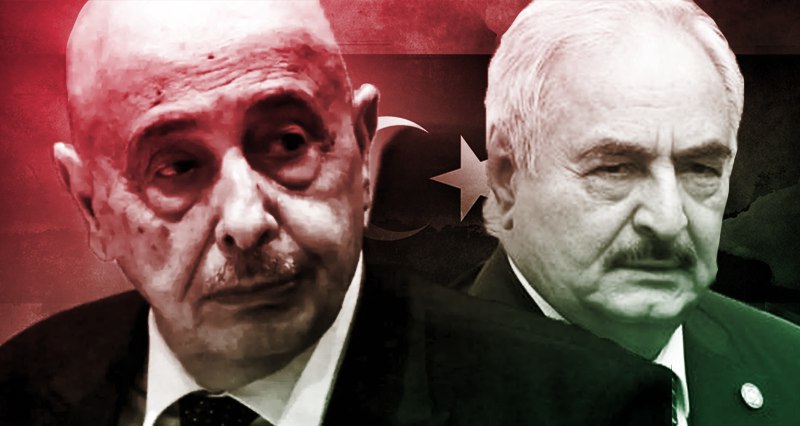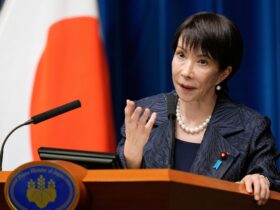Saleh’s proposals
On April 23, Aguila Saleh Issa, Chairman of the House of Representatives of Libya (HoR) – the parliament in Tobruk in eastern part of the country, made an unexpected political proposal. He called for the reestablishment of the Presidential Council and Government, for a change of the Constitution and for the organization of presidential and parliamentary elections afterwards.
The main idea was to form a new Presidential Council from the representatives of the three regions of Libya – Tripolitania, Cyrenaica and Fezzan. At the same time, it is planned to involve the UN in the process.
“I hope that the UN will address the call of the public and political elites, which were chosen in the three regions to elect and nominate their representatives in the Presidential Council, and exclude those parties that do not want to achieve a just solution to the Libyan crisis and are behind the fact that Libya has suffered from tragedies, oppression and corruption,” Aguila Saleh Issa said.
The House of Representatives is now juridically the only democratically elected structure in the country. The fact that this structure supports Khalifa Haftar and his Libyan National Army (LNA) gives the Haftar at least the appearance of legality.
The Presidential Council is, in turn, the body formed as a result of the 2015 The Libyan Political agreement, which was to end the civil war in Libya. De facto, this council was to exercise collective leadership over Libya, becoming the guarantor of its unity. However, because of the renewed conflict, the Libyan Political agreement was not implemented, and the Presidential Council did not become a true collective structure which represents the whole country.
It is currently a structure led by the head of the Government of National Accord (GNA), Fayez Al-Sarraj. This government itself was created as a temporary measure in order to transfer power to the permanent government until the beginning of 2018, when the Constitution was adopted. However, neither the new constitution nor the permanent government has emerged due to the new outbreak of conflict between the parties to the The Libyan Political agreement. One actor is the Western Libyan factions and supporters of the Muslim Brotherhood in Tripoli, who hold the capital and are acting on behalf of the GNA. They are supported by Turkey and Qatar. They are opposed to General Khalifa Haftar, who is supported by the regular Libyan National Army, the House of Representatives, and a number of intra-Libyan forces dissatisfied with the Muslim Brotherhood. This coalition was supported by political opponents of Turkey and Qatar: Egypt, UAE, Saudi Arabia, France, and others.
More complex strategies are being pursued by the US, Russia and Italy, who are interacting with all parties to the conflict. At the same time, until recently, Russia was more inclined to support Haftar and Italy was closer to the GNA, while the US was trying to use its agents of influence in both camps.
HoR head Ageela Saleh proposes 8-point political initiative – https://t.co/YegMhtmX10 pic.twitter.com/kkRpr0BE4o
— libyaherald (@libyaherald) April 25, 2020
Split of the GNAs opponents
Simultaneously with the statement of Aguila Saleh Issa, General Khalifa Haftar also addressed the Libyans on April 23. The position voiced by the LNA commander provides an opportunity for broad interpretation. He promised to fight the “terrorists” in Tripoli and praised his own army in every possible way.
“The tragic situation in Libya and the suffering of the people has reached its climax which leaves no choice for Libyans except to clearly announce the rejection of the [Libyan] Political Agreement and all the institutions that originated from it..” said Haftar. At the same time, Haftar hinted at the need to create a new “institution” that the people consider worthy “to lead the country during this time”.
This was followed by developments in areas under Haftar’s control, including inviting the general to assume full authority (not only military but also political functions).
Such appeals were made by the Libyan Sheikhs and Elders Council, the Council of Sheikhs and Dignitaries of Tarhuna, the tribe of Huweilin of Zelten, the tribe of Al-Habbun, the Supreme Council of Al-Ashraf and Al-Murabitin, Sheikhs, Elders, the youth of Al-Ajilat. Mass demonstrations were held in the cities of Benghazi, Derna, Sirte, Beida, Ajdabiya and Marj. The idea was also supported by some deputies of the House of Representatives.
“We declare our full mandate to Commander Marshal Khalifa Haftar to govern the affairs and leadership of the country and to adopt a constitutional declaration guaranteeing all Libyans the preservation of their civil country and its transition to building their political institutions in the right way,” the Council of Sheikhs and Dignitaries of Tarhuna, for example, said in a statement.
It’s well known that such demonstrations are nothing more than a means of legitimization of the decisions that Haftar himself made – since similar protests led to the shutdown of Libyan oil production this year.
The proposals of Aguila Saleh Issa and Khalifa Haftar contradict each other. Saleh proposes to relaunch the political process in Libya and to form a new civilian Government. His proposals should, of course, limit the GNAs authority and eliminate it as it stands. Moreover, Saleh proposes to ban the same person from being elected prime minister and head of the presidential council. Those functions are now being combined by Fayez Al-Sarraj.
At the same time, however, Saleh has proposed that participants in the new Presidential Council be elected from three historic Libyan territories, and it is very likely that they will not be from the military. This already reduces the powers of Haftar. In this format, he can only claim to be an observer, not a political leader.
Demonstrations in support of the political role of the LNA are a de facto call for an open military dictatorship in Libya headed by General Haftar. Thus, in the camp of opponents of the GNA, there is a split between the political center represented by Aguila Saleh Issah and HoR and the military center headed by Khalifa Haftar.

Benefits for Turkey
This development can play into Turkey’s hands. First and foremost, Saleh’s proposals provide an opportunity for Ankara to try to secure its interests in Libya through diplomacy and political dialogue rather than military force. The sidelining ofHaftar may make the prospect of an agreement with the government in Tobruk more acceptable. At the same time, such a prospect would also force Ankara to make compromises.
However, if Haftar does manage to become a full-fledged military dictator, it would paradoxically lead to a situation even more favorable for Turkey than the start of political dialogue.
First, the LNA commander himself will undermine all his claims to legitimacy by engaging in an open confrontation with the House of Representatives, the democratically elected parliament of the country. Secondly, he will pit those political forces in eastern Libya that are behind Aguila Saleh against himself. Thirdly, Haftar’s open dictatorship would weaken his international support.
It will be difficult for the French Government to explain to its people, especially the descendants of Arab migrants, why they are supporting a military dictator in Libya, especially if we recall the rhetoric used to justify the overthrow of Muammar Gaddafi. Franco-Algerians, who supported the “Algerian Spring” and the overthrow of President Abdelaziz Bouteflika, are unlikely to rejoice at the appearance of another regime next to Algeria headed by an elderly general.
Fıransa’nın desteklediği terörist ve yeni nesil diktatör Hafter Fransa’ya selam durmuş. Fıransa dün olduğu gibi bugün de kanlı ellere sahiptir. pic.twitter.com/HoUXXkTIfV
— Cahit Tuz / جاهد توز (@CahitTuz) April 12, 2019
In the US, the Democratic Party will not give up “the pleasure of attacking President Trump if they find out the slightest military contacts with dictator Haftar.” The opportunity to garner support from the US will have to be forgotten.
The Russian factor should also not be forgotten: Moscow traditionally supports only those forces that have at least minimal level of legitimacy, such as in Syria. President Vladimir Putin is still a lawyer by profession. How would Moscow feel about a military coup that would cast a shadow on its image?
The support of Saudi Arabia and the UAE for a dictator will also cost them international prestige. They already support Egypt’s President El-Sisi, who came to power after the coup, and are unlikely to desire to strengthen the image of freedom stranglers in the Arab world.
Haftar will also have to meet the UN and EU in a completely different way than he is accustomed to, as a military dictatorship contradicts the basic democratic and humanistic principles of these organizations. It is possible that sanctions will be imposed against Haftar. His diplomatic weight will fall, but the military support of the GNA by Turkey will be justified by the struggle against the dictatorship.
The road to failure
Khalifa Haftar’s powerful appetites can, oddly enough, serve Turkish interests well. Sooner or later he or those who replace him will negotiate with Tripoli, but they will be in a much worse negotiating position, which means their opponents – and Turkey’s allies – will be better able to defend their positions.
There is another interesting aspect at play: Haftar is not a young man, and military dictators rarely die in their beds. If the country experiences another coup, he could end up in court like Augusto Pinochet before him.
The example of the recently overthrown Sudanese President Omar al-Bashir may indicate that military dictatorship in Africa is becoming a thing of the past. Another famous dictator, former Zimbabwean President Robert Mugabe, knew well that for every elderly dictator, there is a young challenger willing to oust him, and that such a coup would not cause any condemnation on the part of the world community.
At the same time, the departure of any military dictator in the absence of a mechanism of a transfer of power will be fraught with a new round of civil conflicts, as evidenced by the history of most African countries of the last century.
Khalifa Haftar’s choice of an open military dictatorship is undoubtedly a sign that he is hopelessly stuck somewhere in the 1980s when he was captured by the troops of the Republic of Chad. At the time, it was normal and even effective– now, it is likely a road to suicide. Let’s not get in the way if he chooses to follow this path.

















Leave a Reply